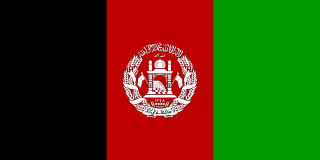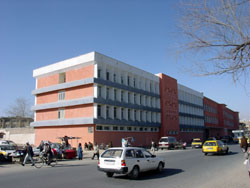
Mohammad Qasim Fahim was a military commander and politician in Afghanistan who served as Vice President from June 2002 until December 2004 and from November 2009 until his death. He was considered a powerful and influential figure during the Karzai Administration.

Gul Agha Sherzai, also known as Mohammad Shafiq, is a politician in Afghanistan. He is the former governor of Nangarhar province in eastern Afghanistan. He previously served as Governor of Kandahar province, in the early 1990s and from 2001 until 2003. In October 2013, Sherzai resigned from his post as governor and formally announced himself as a candidate for Afghanistan's 2014 Presidential Election, and served as the minister of border and tribal affairs until the Taliban victory in 2021.

Younus Qanooni is an Afghan politician who was Vice President of Afghanistan. An ethnic Tajik, Qanooni is the leader of the Afghanistan e Naween political party and former Speaker of the House of the People.

The Transitional Islamic State of Afghanistan (TISA), also known as the Afghan Transitional Authority, was the name of a temporary administration of Afghanistan put in place by the loya jirga of June 2002. It succeeded the original Islamic State of Afghanistan and preceded the Islamic Republic of Afghanistan (2004–2021).

The Northern Alliance, officially known as the United Islamic National Front for the Salvation of Afghanistan, was a military alliance of groups that operated between late 1996 to 2001 after the Islamic Emirate of Afghanistan (Taliban) took over Kabul. The United Front was originally assembled by key leaders of the Islamic State of Afghanistan, particularly president Burhanuddin Rabbani and former Defense Minister Ahmad Shah Massoud. Initially it included mostly Tajiks but by 2000, leaders of other ethnic groups had joined the Northern Alliance. This included Karim Khalili, Abdul Rashid Dostum, Abdullah Abdullah, Mohammad Mohaqiq, Abdul Qadir, Asif Mohseni, Amrullah Saleh and others.
Ahmad Zia Massoud is an Afghan politician who was the vice president of Afghanistan in the first elected administration of President Hamid Karzai, from December 2004 to November 2009. He is a younger brother of the late Ahmad Shah Massoud, the resistance leader against the Soviet invasion of Afghanistan and against the Taliban. In late 2011, Ahmad Zia Massoud joined hands with major leaders in the National Front of Afghanistan, which strongly opposed a return of the Taliban to power. The National Front was generally regarded as a reformation of the United Front which with U.S. air support temporarily removed the Taliban from power in late 2001.
Taj Mohammad Wardak is an Afghan politician, from the Pashtun ethnic group. He spent some of the period of the Taliban's administration in the United States of America, and became an American citizen.
The United National Front was a coalition of various political parties in Afghanistan. The group was a broad coalition of former and current strongmen, commanders from the anti-Soviet resistance, ex-Communist leaders, and various social and ethnic groups. Its leader was former President of Afghanistan Burhanuddin Rabbani. Many of its members were formerly part of the similarly named United Islamic Front.

The Afghan Interim Administration (AIA), also known as the Afghan Interim Authority, was the first administration of Afghanistan after the fall of the Taliban regime and was the highest authority of the country from 22 December 2001 until 13 July 2002.
Habibia High School is a school in Kabul, Afghanistan which has educated many of the former and current Afghan elite, including former Presidents Ashraf Ghani and Hamid Karzai, as well as musician Ahmad Zahir. It was founded by King Habibullah Khan in 1903 and is considered one of the oldest Schools In Afghanistan. It is situated in the south of the city in a district known as Karteh Seh.
Mohammad Yousef Pashtun is an Afghan technocrat and politician. He served as Minister of Urban Development and Housing for two terms and as Governor of Kandahar province in 2003, replacing Gul Agha Sherzai under President Hamid Karzai's administration. In 2010, he was appointed as Senior Adviser to President Karzai on Construction, Mines, Water & Energy. In 2014, minister Pashtun continued to serve as Senior Adviser to President Ashraf Ghani. Yِousef Pashtun is also chairing the Kabul New City Development Authority Board.

Abdullah Abdullah is an Afghan politician who led the High Council for National Reconciliation (HCNR) from May 2020 until August 2021, when the Afghan government was overthrown by the Taliban. The council had been established to facilitate peace talks between the Islamic Republic of Afghanistan and the Taliban insurgents. Abdullah served as the Chief Executive of Afghanistan from September 2014 to March 2020, and as Minister of Foreign Affairs from December 2001 to April 2005. Prior to that, he was a senior member of the Northern Alliance, working as an adviser to Ahmad Shah Massoud. He worked as an ophthalmologist and medical doctor in the 1980s.

The Ministry of Finance of Afghanistan is responsible for the implementation and execution of the budget, collection of taxes, organization, and control of public expenses in Afghanistan; it also controls the management of the Custom Affairs. The Ministry of Finance provides a quarterly report to inform the public and the executive cabinet of advancements in Afghanistan's financial sector. The current Finance Minister is Nasir Akhund.
The First Karzai cabinet lead the administration of Afghanistan between 2004, the year Hamid Karzai won the first Afghan presidential election and 2009 when the second presidential election took place. In 2006 there was a major cabinet reshuffle. The first Karzai cabinet followed the Afghan Transitional Administration which was put in place by the 2002 loya jirga. Karzai announced the names of the cabinet on 23 December 2004. The cabinet was sworn in on 24 December 2002 and held its first cabinet meeting on 27 December. This cabinet consisted of 27 ministers, including two women.

The National Coalition of Afghanistan, is a political coalition in Afghanistan led by Abdullah Abdullah, Afghanistan's former foreign minister (2001–2005) and main challenger of President Hamid Karzai in the 2009 Afghan presidential elections. Abdullah Abdullah was a close friend of the Northern Alliance leader Ahmad Shah Massoud who was assassinated two days before the September 11 attacks.
The second Karzai cabinet was the cabinet of Afghanistan that led the government from the re-election of president Hamid Karzai in 2009 until the end of his term in 2014. The cabinet consisted of the president, his two vice-presidents, 18 ministers who received approval from the Afghan Parliament, and 7 acting ministers who have not been approved.
The 2019 Afghanistan Provincial Challenge Cup was a List A cricket competition that took place in Afghanistan between 31 July and 10 August 2019. It was the third year of domestic List A cricket to be played in Afghanistan, following the announcements by the International Cricket Council (ICC) in February and May 2017. Eight teams qualified for the tournament, and were divided into two groups of four.